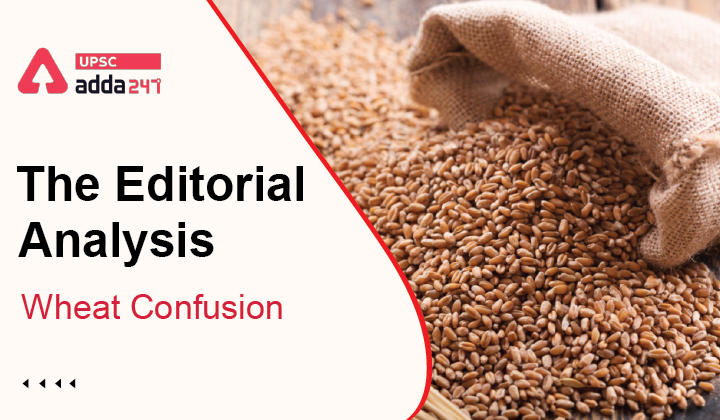Table of Contents
Wheat Export Ban Controversy- Relevance for UPSC Exam
- GS Paper 3: Indian Economy- Issues relating to planning, mobilization of resources, growth, development and employment.
Wheat Export Ban Controversy in news
- Recently, India surprised the world with its decision to bar wheat export with immediate effect.
- However, government went defensive on its wheat export order and modified it.
- Initially, the Centre had amended the order by allowing export consignments registered in the Customs Department’s systems and handed over for examination on or prior to May 13.
Impact of Wheat Export Ban Controversy
- Addressing a UN “Global Food Security Call to Action” ministerial meeting Minister of State for External Affairs emphasised that the restrictions made allowance for countries that had food security needs.
- More than farmers, it is traders who stand to benefit from the limited easing of restrictions of wheat export ban.
- Criticism in International Community: India has faced criticism from the G-7’s Agriculture Ministers for its decision to ban wheat export.
India Relaxes Wheat Export Ban
Why Wheat Export Ban?
- Supply-Demand Mismatch: indications of a mismatch in demand and supply were evident, leading to rising wheat prices and subsequent export ban by the government.
- Key reasons for the demand supply mismatch are-
- Rising levels of wholesale and retail inflation,
- Impact of the Russia-Ukraine war and
- A lower opening balance of wheat in the Central pool for the public distribution system
- Low Production due to Unfavourable Weather: several parts of wheat-producing States in the north experienced unusually warm weather in March-April.
- Due to above, the Government lowered marginally, early this month, the estimated wheat production, from 111.32 million tonnes to 105 million tonnes.
- Rising International Wheat Prices: Food and Agriculture Organization (FAO) of the United Nations, said that even before the Russia-Ukraine war, wheat prices had reached an all-time high.
- Wheat price rise in International market was mainly due to market conditions and the high prices of energy, fertilizers and other agricultural services.
Government Lifts Export Prohibition in Bamboo Charcoal
Wheat Export Ban- Mixed signals from Government
- Mixed Thinking: before banning the wheat export, the Centre clarified that there was no move to curb wheat export. Centre considered it beneficial as-
- It was the opportune moment for exporters to sell in the international market as wheat from Argentina and Australia would begin arriving next month.
- Promoting Wheat export: Just before the export ban, Union government had taken many initiatives to boost the wheat export like-
- An official announcement was made that trade delegations would be sent to countries such as Morocco, Tunisia, and Indonesia to explore possibilities for wheat export.
- In addition to Egypt, Turkey had given its approval for the import of Indian wheat.
- Increasing the Wheat Export Targets: An announcement had been made that the current year’s target for wheat export had been fixed at 10 million tonnes, three million tonnes higher than last year.
Wheat Export Ban Controversy- Way Forward
- Government should not persist for too long with its current position of “restrictions” on the export of wheat, as the move seems to have hit the farmers.
- Learning from the Past: Lessons must be gleaned from the experience 15 years ago when India took about two years to lift its ban on the export of non-basmati rice, by which time Thailand and Vietnam had moved in to take full advantage.
Conclusion
- Apprehensions of a food shortage are misplaced, and the Government would do well to lift the “restrictions” sooner rather than later.





 TSPSC Group 1 Question Paper 2024, Downl...
TSPSC Group 1 Question Paper 2024, Downl...
 TSPSC Group 1 Answer key 2024 Out, Downl...
TSPSC Group 1 Answer key 2024 Out, Downl...
 UPSC Prelims 2024 Question Paper, Downlo...
UPSC Prelims 2024 Question Paper, Downlo...




